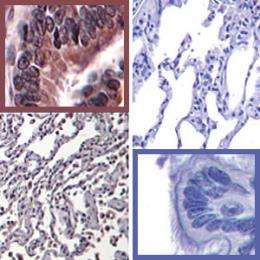Late-stage sepsis suppresses immune system

(Medical Xpress) -- Patients who die from sepsis are likely to have had suppressed immune systems that left them unable to fight infections, researchers at Washington University School of Medicine in St. Louis have shown.
The findings suggest that therapies to rev up the immune response may help save the lives of some patients with the disorder. Sepsis is a severe illness in which bacteria overwhelm the bloodstream.
The researchers compared tissue samples taken from the lungs and spleens of 40 patients who had died of sepsis to those of patients who died from other causes. They reported their findings in the Journal of the American Medical Association.
“More than 225,000 people die each year from sepsis, and developing more effective therapies has been challenging,” says senior investigator Richard S. Hotchkiss, MD, professor of anesthesiology. “This project was focused on trying to understand the mechanisms that underlie how the immune system responds to sepsis.”
That’s been an important question because the onset of sepsis usually includes what doctors call a “cytokine storm,” when the body’s immune system produces a massive inflammatory response. Some patients die during this initial phase. But others survive, including a significant number of patients whose sepsis evolves into a longer, chronic phase.
“These patients often get new infections,” says co-investigator Jonathan M. Green, MD, professor of medicine and of pathology and immunology. “They come into the ICU very sick, and we try to get them over that hump, but then they get stuck and don’t get better. They typically develop new infections, either a bloodstream infection or pneumonia.”
Green, a pulmonary and critical care specialist, and Hotchkiss, an anesthesiologist, have worked together for years treating patients in the ICU at Barnes-Jewish Hospital. But the new research — launched over a cup of coffee — brought them together for the first time in the laboratory.
Hotchkiss had been collecting tissue samples from patients who died from sepsis, and Green brought expertise in lung function and immunology to the project. By analyzing the tissue samples, they determined that sepsis patients’ immune systems were, indeed, suppressed.
First author Jonathan S. Boomer, PhD, analyzed the tissue to determine whether key immune system cells, called T-cells, were activated to respond to secondary infections like pneumonia or whether those cells were defective.
“We found that these T-cells were not able to function in the ways required to fight an infection,” says Boomer, a research instructor in medicine. “T-cells were present in both the lung and the spleen, but they failed to mount an effective immune response.”
Further study revealed that the T-cells sent to the lung to fight infection were stripped of their ability to mount an immune response, possibly by the lung cells themselves.
“It’s as if there’s a switch on the T-cell,” Green says. “But something’s got to flip that switch, and the finger is actually on lung cells. It may be that these T-cells are unable to function properly because cells in the lung aren’t allowing it.”
Hotchkiss’ laboratory found a similar mechanism at work in the spleen. He says taken together, the findings suggest a new direction for sepsis therapy.
“A real benefit of this study is that it points to how the paradigm for treating sepsis should change,” Hotchkiss says. “It’s pretty clear from this study that in some patients, we need to find ways to activate T-cells to fight sepsis.”
He says potential treatment strategies include blocking a cell-death pathway to rev up the T-cells. Another option may involve treatment with a substance called interleukin-7 (IL-7), which is known to activate T-cells.
A major caveat is that it’s not clear which sepsis patients would benefit from treatments that boost the immune response. The researchers plan to continue their collaboration as they work to answer that question.
More information: Boomer JS, et al. Immunosuppression in patients who die of sepsis and multiple organ failure. JAMA, vol. 306 (23), pp. 2594-2605, Dec. 21, 2011.
Ward, PA, Immunosuppression in sepsis (editorial), JAMA













